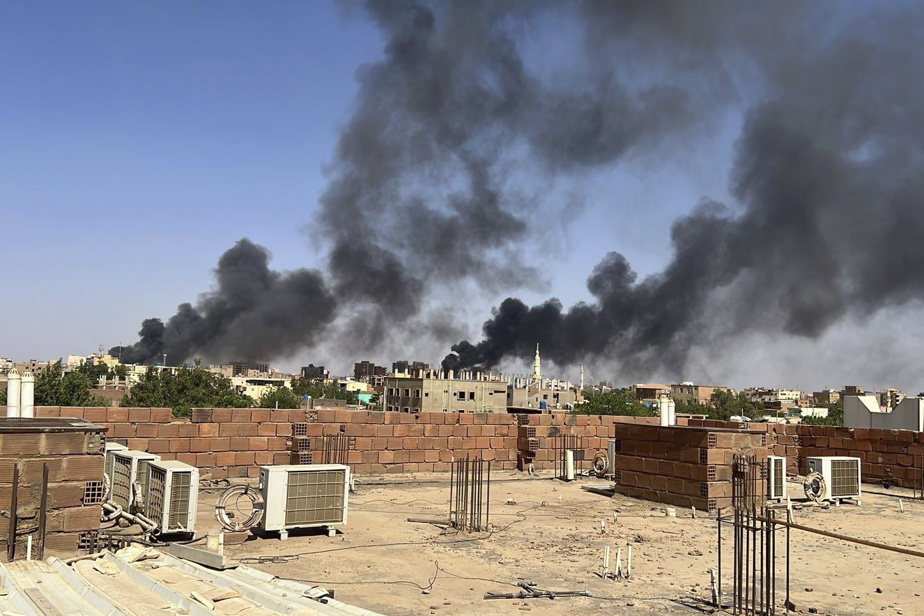(Khartoum) Heavy fighting pitted the Sudanese army on Friday against the paramilitaries of the Rapid Support Forces (RSF) in Khartoum, where the sound of explosions ceased in the evening in some neighborhoods as calls for a ceasefire subsided. multiplied after six days of clashes.
On the first evening of Eid al-Fitr marking the end of Ramadan, witnesses in different parts of the capital said they no longer heard explosions.
Like every day, the FSR and the army again announced a ceasefire on Friday, this time for the three days of the Muslim holiday. But soon after, both sides accused each other of breaking the truce—the RSF in the morning and the army in the evening.
US Secretary of State Antony Blinken said he “welcomes these announcements.” While adding: “it is nevertheless clear that the confrontation continues and that there is no confidence between the two forces”.
Triggered on April 15, the fighting left 413 dead and 3,551 injured, according to the World Health Organization (WHO).
New hospitals were heavily damaged in Khartoum, and four establishments were affected in al-Obeid, 350 km south of the capital, the doctors’ union said during the day: in total “70% of hospitals in the combat zone are out of service”.
To provide assistance to civilians, the International Committee of the Red Cross calls for “immediate and unimpeded humanitarian access […] an obligation under international humanitarian law”.
The fighting mainly opposes Khartoum and Darfur (West), the army under the command of General Abdel Fattah al-Burhane, de facto leader of Sudan since the putsch of 2021, to the FRS led by General Mohamed Hamdane Daglo.
Long latent and confined to negotiations on the conditions of integration of the FSR into regular troops, to finalize a political agreement on the return of civilians to power, the conflict between the two camps has turned into an armed struggle.
In Darfur, one of the poorest regions of Sudan, “the situation is catastrophic”, says a doctor from Médecins sans frontières (MSF).
“There are so many patients that they are treated on the floor in the corridors because there are simply not enough beds,” he said from this area where the Janjawid militiamen, the bulk of the RSF , committed horrific abuses during the Darfur civil war that began in 2003.
The air force, which targets the FSRs scattered in residential areas, does not hesitate to drop bombs. In this chaos, “70% of the 74 hospitals in Khartoum and areas affected by the fighting have been put out of use”, reports the doctors’ union.
Diplomatic consultations are intensifying: the British Foreign Secretary, James Cleverly, has cut short a tour of Asia-Pacific “because of the situation in Sudan”.
On Thursday, UN Secretary General Antonio Guterres and US Secretary of State Antony Blinken called for a ceasefire for “at least” the three days of Eid.
But regrets Sami al-Nour, a resident of Khartoum, “we spend Eid with the sound of gunfire and the smell of death in the background instead of cakes, happy children and good family time”. For Ibrahim Awad, another resident of the capital, “the situation was inevitable: a country with two leaders and two armies cannot move forward”.
General Daglo had been General Burhane’s number two since the putsch of October 2021. The latter appeared Thursday for the first time since the start of hostilities on state television.
“For Eid, our country is bleeding: destruction, desolation and the sound of bullets have taken precedence over joy,” he said. So far, like his rival General Daglo, he had only spoken to the media and not directly addressed the 45 million Sudanese.
For its part, the United States has announced the sending of military personnel to the region to facilitate a possible evacuation of its embassies and nationals; South Korea and Japan will send planes while the airport has been closed since Saturday. The European Union is considering an evacuation as soon as possible by land.
Women and children mainly throng the roads to flee, between checkpoints and corpses.
Since the outbreak of hostilities, 10,000 to 20,000 people, mostly women and children, have crossed into neighboring Chad, according to the UN.
Aid workers were mostly forced to suspend aid after three World Food Program (WFP) staff were killed.
On Friday, the International Organization for Migration (IOM) announced the death of a humanitarian from this UN agency victim of an exchange of fire south of al Obeid.
“Neither Burhane nor Daglo seem to want to give in, the situation could get even worse,” said the International Crisis Group (ICG) research center.
“A long-lasting conflict would be the ruin of Sudan”, the third largest gold producer in Africa where more than a third of the population suffers from hunger, adds the ICG.

